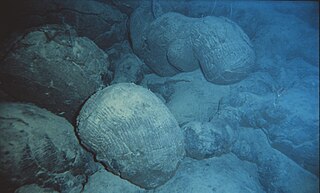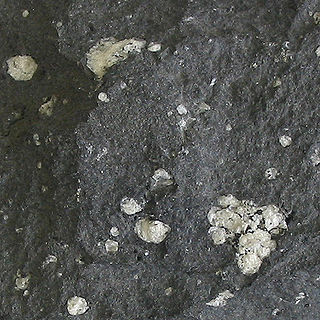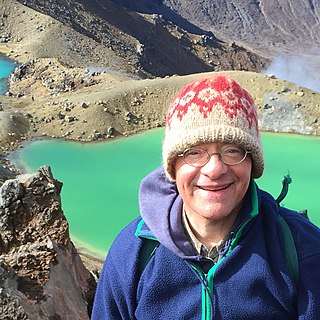
Pillow lavas are lavas that contain characteristic pillow-shaped structures that are attributed to the extrusion of the lava underwater, or subaqueous extrusion. Pillow lavas in volcanic rock are characterized by thick sequences of discontinuous pillow-shaped masses, commonly up to one meter in diameter. They form the upper part of Layer 2 of normal oceanic crust.

A volcanologist, or volcano scientist, is a geologist who focuses on understanding the formation and eruptive activity of volcanoes. Volcanologists frequently visit volcanoes, sometimes active ones, to observe and monitor volcanic eruptions, collect eruptive products including tephra, rock and lava samples. One major focus of inquiry in recent times is the prediction of eruptions to alleviate the impact on surrounding populations and monitor natural hazards associated with volcanic activity. Geologists who research volcanic materials that make up the solid Earth are referred to as igneous petrologists.

Andesite is a volcanic rock of intermediate composition. In a general sense, it is the intermediate type between silica-poor basalt and silica-rich rhyolite. It is fine-grained (aphanitic) to porphyritic in texture, and is composed predominantly of sodium-rich plagioclase plus pyroxene or hornblende.

Petrology is the branch of geology that studies rocks, their mineralogy, composition, texture, structure and the conditions under which they form. Petrology has three subdivisions: igneous, metamorphic, and sedimentary petrology. Igneous and metamorphic petrology are commonly taught together because both make heavy use of chemistry, chemical methods, and phase diagrams. Sedimentary petrology is commonly taught together with stratigraphy because it deals with the processes that form sedimentary rock. Modern sedimentary petrology is making increasing use of chemistry.

Don Lynn Anderson was an American geophysicist who made significant contributions to the understanding of the origin, evolution, structure, and composition of Earth and other planets. An expert in numerous scientific disciplines, Anderson's work combined seismology, solid state physics, geochemistry and petrology to explain how the Earth works. Anderson was best known for his contributions to the understanding of the Earth's deep interior, and more recently, for the plate theory hypothesis that hotspots are the product of plate tectonics rather than narrow plumes emanating from the deep Earth. Anderson was Professor (Emeritus) of Geophysics in the Division of Geological and Planetary Sciences at the California Institute of Technology (Caltech). He received numerous awards from geophysical, geological and astronomical societies. In 1998 he was awarded the Crafoord Prize by the Royal Swedish Academy of Sciences along with Adam Dziewonski. Later that year, Anderson received the National Medal of Science. He held honorary doctorates from Rensselaer Polytechnic Institute and the University of Paris (Sorbonne), and served on numerous university advisory committees, including those at Harvard, Princeton, Yale, University of Chicago, Stanford, University of Paris, Purdue University, and Rice University. Anderson's wide-ranging research resulted in hundreds of published papers in the fields of planetary science, seismology, mineral physics, petrology, geochemistry, tectonics and the philosophy of science.

The Mineralogical Society of America (MSA) is a scientific membership organization. MSA was founded in 1919 for the advancement of mineralogy, crystallography, geochemistry, and petrology, and promotion of their uses in other sciences, industry, and the arts. It encourages fundamental research about natural materials; supports the teaching of mineralogical concepts and procedures to students of mineralogy and related arts and sciences; and attempts to raise the scientific literacy of society with respect to issues involving mineralogy. The Society encourages the general preservation of mineral collections, displays, mineral localities, type minerals and scientific data. MSA represents the United States with regard to the science of mineralogy in any international context. The Society was incorporated in 1937 and approved as a nonprofit organization in 1959.

Fractional crystallization, or crystal fractionation, is one of the most important geochemical and physical processes operating within crust and mantle of a rocky planetary body, such as the Earth. It is important in the formation of igneous rocks because it is one of the main processes of magmatic differentiation. Fractional crystallization is also important in the formation of sedimentary evaporite rocks or simply fractional crystallization is the removal of early formed crystals from an Original homogeneous magma so that the crystals are prevented from further reaction with the residual melt.
W. Gary Ernst is an American geologist specializing in petrology and geochemistry. He currently is the Benjamin M. Page Professor Emeritus in Stanford University's department of geological sciences.
Jonathan David Blundy FRS is Royal Society Research Professor at the School of Earth Sciences at the University of Oxford and honorary professor at the University of Bristol.
Dr. E-An Zen (任以安) was born in Peking, China, May 31, 1928, and came to the U.S. in 1946. He became a citizen in 1963. Since 1990 he was adjunct professor at the University of Maryland. He died on March 29, 2014, at the age of 85.
Bernard (Bernie) Wood is a British geologist, and professor of mineralogy and senior research fellow at the University of Oxford. He specializes in the thermodynamics of geological systems, using experimental techniques. He is a prominent figure in the field of experimental petrology, having received multiple awards throughout his career and taught at several universities worldwide.
Germaine Anne Joplin was an Australian geologist and winner of the Clarke Medal in 1963.
Daniela Rubatto is a Professor of geochemistry at the University of Bern, Switzerland. Her areas of interest and expertise are in isotope geochemistry, metamorphic petrology, mineralogy, tectonics, inorganic geochemistry, and geochronology.

Katharine Venable Cashman is an American volcanologist, professor of volcanology at the University of Bristol and former Philip H. Knight Professor of Natural Science at the University of Oregon.
Mihir Kumar Bose (1933–2009) was an Indian geologist and a professor at the Presidency College, Kolkata. He was known for his studies on igneous petrology and was an elected fellow of the Geological Survey of India, Indian National Science Academy, and the Indian Academy of Sciences. The Council of Scientific and Industrial Research, the apex agency of the Government of India for scientific research, awarded him the Shanti Swarup Bhatnagar Prize for Science and Technology, one of the highest Indian science awards for his contributions to Earth, Atmosphere, Ocean and Planetary Sciences in 1976.

Mark S. Ghiorso is an American geochemist who resides in Seattle, Washington. He is best known for creating MELTS, a software tool for thermodynamic modeling of phase equilibria in magmatic systems.
Ian Stuart Edward Carmichael was a British-born American igneous petrologist and volcanologist who established extensive quantitative methods for research in the thermodynamics of magma.
Rebecca Ann Lange is a professor of experimental petrology, magmatism and volcanism at the University of Michigan. Her research investigates how magmatism has shaped the evolution of the Earth, as well as the formation of continental crust. She is a Fellow of the Mineralogical Society of America and was awarded the F.W. Clarke Medal in 1995.

Ikuo Kushiro MJA is a Japanese petrologist, known for his research in experimental petrology. His experiments on peridotites contributed significantly to the understanding of the formation of magma under mid-ocean ridges and island arcs.
Edward Manin Stolper is an American geologist, petrologist, and planetologist. He is known for his research on igneous rocks and volatiles in igneous processes, especially his research involving "pioneering experiments defining the behavior of volatiles in silicate melts and glasses."









